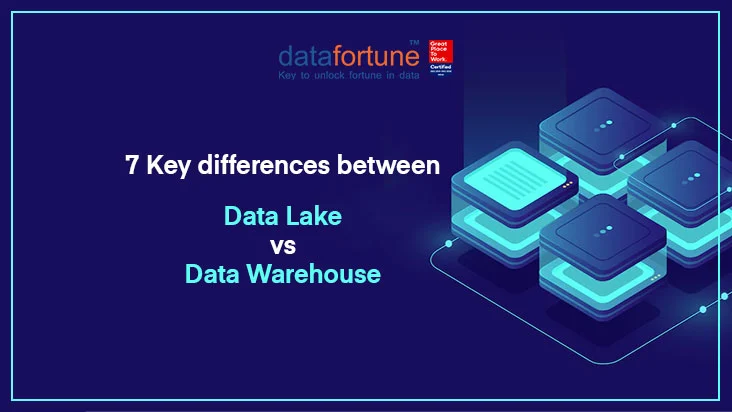7 Key Differences Between Data Lakes vs Data Warehouse
Data lakes and data warehouse – both these terms may seem similar. And you may tend to use them interchangeably. But both these terms are different.
A data lake is a location where you can enter new data without any hurdles. It is a massive repository of unstructured data with no specific purpose. Hence, the data can help discover new ideas and conduct various data experiments. But as the data in a data lake is unstructured, many people find the storage place messy.
A data warehouse is a central repository of information that can support informed decision-making. It combines the fluidity of a data lake with incredible data management capabilities, thus making it a trend within the data management realm.
Now that we know what a data lake and a data warehouse is fundamentally, let’s look at seven key differences between both these data repositories.
| Sr. No | Parameter | Data Warehouse | Data Lake |
| 1 | Operations | A data warehouse helps with Online Analytical Processing (OLAP). It includes query aggregation, running reports, etc. These operations happen after performing the transactions. | A data lake is usually used to perform raw data analysis. It collects raw data in multiple formats for further analysis. Data lake doesn’t require you to define the schema while capturing data. |
| 2 | Schema | A data warehouse uses schema-on-write. Before you store the data, it has to be transformed and provided for application in analytics and reporting. You will have to know the purpose of the data before you import it. | A data lake uses schema-on-read. You don’t need a single schema and can store any type of data in the lake. You can interpret the schema later while you read the data. It means, all your teams can store their data in the data lake without depending on your IT team. |
| 3 | Users | A data warehouse is used by business professionals involved in reporting. | Usually, users of data lakes include data scientists and analysts. Here, these professionals get access to a massive amount of diverse data. They can perform different types of analytics to seek insights and decipher patterns that help transform the data into practically useful business information. |
| 4 | Data Quality | A data warehouse contains superior quality data. The data undergoes extensive curation before it becomes part of the warehouse. | On the other hand, a data lake comprises raw data. This data may or may not be curated for quality or value purposes. |
| 5 | Technology | Data warehouse applications leverage relational database technologies due to the support they provide for quick queries against structured data. | A data lake uses Hadoop owing to its agility, scalability and the ability to diverse data structures. Other vendors include Google Cloud, AWS, Oracle, Databricks, Cloudera, etc. |
| 6 | Security | Data warehouses tend to be more secure considering the quality and nature of information they store. Only authorized people can access the repository. | Data lake contains random unstructured data. Besides, it is a relatively new phenomenon and hence the security aspect is yet nascent. Besides, since it uses open-source technologies the security isn’t as robust as its warehouse counterpart. |
| 7 | Adaptability | Modifying a data warehouse could be challenging. It takes time to get the warehouse’s structure correct during development. Thus, the design has to be robust enough to adapt to change. | With a data lake, users can venture beyond the lake’s structure to explore data creatively and answer queries at their own convenience. It is because data is stored in its raw state and is accessible to all. |
Data warehouses are more sophisticated systems. Hence, the cost of data storage is high. But on the other hand, data lakes use open-source technologies make data management in data lakes a relatively cheaper affair.
Optimize Data Management with Datafortune!
For something as precious as data, you need customized data management strategies that help you manage data efficiently and leverage it optimally for decision-making.
Datafortune helps you do what it takes to make the most from your data and data repositories. Our data management strategies involve creating a data roadmap that helps you achieve data excellence, value and ROI in an organized manner. Click to connect with us and allow us to help you succeed in your data management endeavors.



